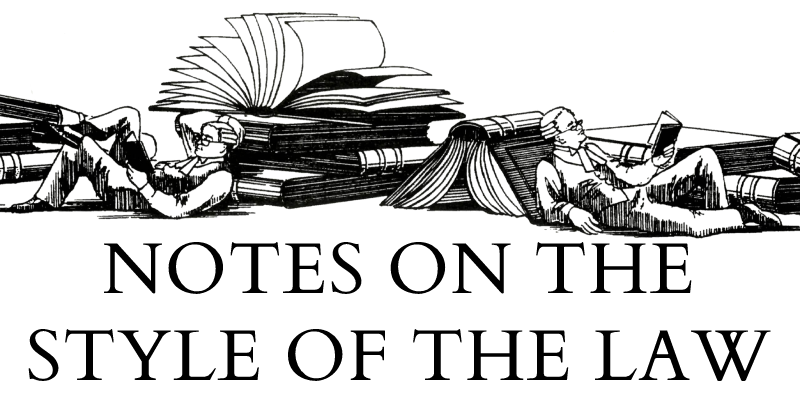

What, in legal writing, is the unforgivable sin? There are many wicked and venal practices in writing that involve essentially. They ought all to be avoided. However, if we must identify one as the absolute worst thing the legal writer can do (or fail to do), what is it?
One tempting answer is abject vandalism. For instance, one can think of the sort of malefactor who puts a giant picture of a cartoon dragon as the background to pleadings. Michael Levenson, ‘Judge Rejects Lawsuit With Dragon Logo, Calling It “Juvenile and Impertinent”’,New York Times (29 April 2025), citing Jane Doe № 2 v Clinton County (Order Striking Complaint), Case № 1:25-cv-00368-RSK (WD Michigan, 28 April 2025, unreported), per Magistrate Judge Kent. https://www.nytimes.com/2025/04/29/us/dragon-lawyer-lawsuit.html (accessed 6 June 2025). The same is true of the actions of some judges, like District Judge (Magistrates’ Courts) McGarva in the recent case of R v Coskun. Sentencing Remarks of 2 June 2025, Westminster Magistrates’ Court. https://www.judiciary.uk/wp-content/uploads/2025/06/Rex-v-Hamit-Coskun.pdf (accessed 6 June 2025). In that case, the judge, for no reason other than seeming pique, chose to set the sentencing remarks in Monotype Footlight, a typeface completely unsuited for law and with no italic (meaning the horror of an oblique had to be used). An oblique is an abomination against typography whereby a computer programme, in the absence of a true designed italic, rotates the characters of the roman face so as to give the illusion of a fake italic. It commonly occurs where, by error, the typist has forgotten to load the italic face or used a typeface with no italic at all. There can be no defence to such atrocity, but there is mitigation. Though ignorance is no excuse, the wrongdoers who make their legal texts ugly are at least trying something novel. They are aware that the dull zombie conventions, which have arisen from ignorance of legal typography, leave something to be desired. With a mixture of stupidity and arrogance, they make things worse, but they are at least trying to catch the reader’s interest with a distinctive design.
If not vandalism, then perhaps obscurantism. Dr Isaac Asimov posited that, in writing, the one unforgivable sin was to be dull and impenetrable—that is, obscure. Dull formulaic writing signalled the author was unconcerned with communicating his ideas. Instead, such a writer, common in academia, defensively hides matters under layers of turgid complexity, such that no one can criticise matters… because no one can understand what is being said. To quote the good doctor:
I suspect that many a scholar doubts his own intellectual capacity (for reasons which 1, not being a psychiatrist, will not puzzle over) and is eager to emphasise that capacity in the only way he knows how. He uses long words, jargon which he invents and others then adopt, spavined sentences from which broken dependent clauses hang limply, and lines of thought which meander helplessly and end nowhere. Isaac Asimov, Asimov’s Galaxy 43 (Doubleday 1989)
This is plainly evident in academic legal writing and quite a few pleadings. There is a reason the most common advice in general manuals of legal writing is for precise clarity and against needless complexity. Note that the goal here is clarity, not simplicity itself. Sometimes, legal ideas are complex and forced simplicity risks condescension and confusion. The point is to pursue clarity and precision. This will often mean simplicity. but it is clear communication of precise ideas which is the goal. However, complexity added solely for the purpose of sounding complex, with the goal of obscuring (for legal advantage or academic prestige) the underlying idea is a great evil in writing. It leads to suspicions that lawyers seek to deliberately complicate matters to keep up the rents the legal monopoly enjoys from the general public. It renders even brilliant judges unable to follow matters without supplementary explanation. Worst of all, it undermines the fundamental purpose of legal writing: reasoning. If writing cannot be understood, it is an obstacle to us reasoning together.
Obscurantism is a very grave matter but it most often is a function of a deeper sin, the one I consider truly unforgivable. Few legal writers set out to be deliberately impenetrable and those who do suffer the consequences when there work is (as applicable) not persuasive to judges or cited by other academics. Rather, it is an expression of laziness, of simply shoving words onto a page without caring much for how they might be read by others.
This leads us to the true unpardonable sin: failing to care. A writer who treats any piece of legal composition, from a blog posting to a court judgment, as disposable, irrelevant, or not for public consumption, commits the worst evil of all. The nature of the common law is that we are all in dialogue, that everything may be precedent, I will ignore for the sake of simplicity the problem of ‘unpublished’ opinions in some American jurisdictions here, but suffice it to say that I think it is a very bad idea to ever have judgments excluded from precedent. To do so invites poor legal reasoning. However, no sane judge in those jurisdictions would say unpublished opinions do not matter or are not worth effort. Moreover, even if no one outside a case reads a judgment or pleading, the case matters enormously to the parties involved at every stage. There are no irrelevant small cases that can be safely decided sloppily, despite what some civil justice ‘reformers’ seem to think.
An example of this evil came in February in Abbotsley Ltd v Pheasantland Ltd (№ 2), [2025] EWHC 217, KBD where Her Honour Judge Walden-Smith wrote ‘As this is a short point in which typographical and grammatical errors can be forgiven’. ibid, ¶ 1 Her Honour, with no sense of irony, forgot to add a full stop to the end of that sentence.
Naturally, typographical and grammatical errors occur in all writing (including in this publication). All writers must hope they can be forgiven by gracious readers. However, it is Her Honour claiming that some legal writing, let alone a judgment of HM High Court of Justice, is so trivial as to not need proofreading, which is unforgivable. The idea that any judgment, any point, however short, is so pointless that there is no need to treat it with care, is repugnant. Every piece of legal writing matters. Every sentence.
A legal writer, be she a law student or a senior judge, who does not care about what she is writing is wasting her time and that of the reader. The law matters and we must care. Experiments in style, typography, and other matters may go horribly wrong, but they are at least expressions of care by the writer. The intent is good. Apathy, by contrast, is worse because of the mens rea behind it. The law is worth caring about and every contribution to it (and everything we write in any legal forum is a small contribution to the sources of our legal reasoning) matters.
I will conclude with a quotation from Mr Stanley Kubrick, in the context of filmmaking, which I think applicable to legal writing:
There is such a total sense of demoralisation if you say you don’t care. […] You either care or you don’t, and I simply don’t know where to draw the line between those two points. Vincent LoBrutto, Stanley Kubrick: A Biography 405 (Donald I. Fine Books 1997)
Be the sort of legal writer who cares.

© 2025; 3 Car III, Elijah Z Granet, but licensed to all under the terms of Creative Commons licence
CC-BY-SA 4.0
Published by

GRANET PRESS
LIMITED



There's an incomplete sentence:
ReplyDelete> The same is true of judges who, like District Judge (Magistrates’ Courts) McGarva in the recent case of R v Coskun,2 In that case,